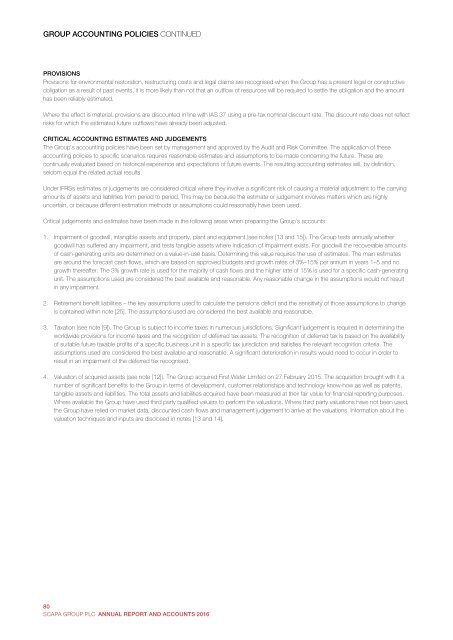20645_Scapa_AR_160504
Create successful ePaper yourself
Turn your PDF publications into a flip-book with our unique Google optimized e-Paper software.
GROUP ACCOUNTING POLICIES CONTINUED<br />
PROVISIONS<br />
Provisions for environmental restoration, restructuring costs and legal claims are recognised when the Group has a present legal or constructive<br />
obligation as a result of past events, it is more likely than not that an outflow of resources will be required to settle the obligation and the amount<br />
has been reliably estimated.<br />
Where the effect is material, provisions are discounted in line with IAS 37 using a pre-tax nominal discount rate. The discount rate does not reflect<br />
risks for which the estimated future outflows have already been adjusted.<br />
CRITICAL ACCOUNTING ESTIMATES AND JUDGEMENTS<br />
The Group’s accounting policies have been set by management and approved by the Audit and Risk Committee. The application of these<br />
accounting policies to specific scenarios requires reasonable estimates and assumptions to be made concerning the future. These are<br />
continually evaluated based on historical experience and expectations of future events. The resulting accounting estimates will, by definition,<br />
seldom equal the related actual results.<br />
Under IFRSs estimates or judgements are considered critical where they involve a significant risk of causing a material adjustment to the carrying<br />
amounts of assets and liabilities from period to period. This may be because the estimate or judgement involves matters which are highly<br />
uncertain, or because different estimation methods or assumptions could reasonably have been used.<br />
Critical judgements and estimates have been made in the following areas when preparing the Group’s accounts:<br />
1. Impairment of goodwill, intangible assets and property, plant and equipment (see notes [13 and 15]). The Group tests annually whether<br />
goodwill has suffered any impairment, and tests tangible assets where indication of impairment exists. For goodwill the recoverable amounts<br />
of cash-generating units are determined on a value-in-use basis. Determining this value requires the use of estimates. The main estimates<br />
are around the forecast cash flows, which are based on approved budgets and growth rates of 3%–15% per annum in years 1–5 and no<br />
growth thereafter. The 3% growth rate is used for the majority of cash flows and the higher rate of 15% is used for a specific cash-generating<br />
unit. The assumptions used are considered the best available and reasonable. Any reasonable change in the assumptions would not result<br />
in any impairment.<br />
2. Retirement benefit liabilities – the key assumptions used to calculate the pensions deficit and the sensitivity of those assumptions to change<br />
is contained within note [25]. The assumptions used are considered the best available and reasonable.<br />
3. Taxation (see note [9]). The Group is subject to income taxes in numerous jurisdictions. Significant judgement is required in determining the<br />
worldwide provisions for income taxes and the recognition of deferred tax assets. The recognition of deferred tax is based on the availability<br />
of suitable future taxable profits of a specific business unit in a specific tax jurisdiction and satisfies the relevant recognition criteria. The<br />
assumptions used are considered the best available and reasonable. A significant deterioration in results would need to occur in order to<br />
result in an impairment of the deferred tax recognised.<br />
4. Valuation of acquired assets (see note [12]). The Group acquired First Water Limited on 27 February 2015. The acquisition brought with it a<br />
number of significant benefits to the Group in terms of development, customer relationships and technology know-how as well as patents,<br />
tangible assets and liabilities. The total assets and liabilities acquired have been measured at their fair value for financial reporting purposes.<br />
Where available the Group have used third party qualified valuers to perform the valuations. Where third party valuations have not been used,<br />
the Group have relied on market data, discounted cash flows and management judgement to arrive at the valuations. Information about the<br />
valuation techniques and inputs are disclosed in notes [13 and 14].<br />
80<br />
SCAPA GROUP PLC ANNUAL REPORT AND ACCOUNTS 2016<br />
75<br />
Annual Report and Accounts 2016 <strong>Scapa</strong> Group plc
















